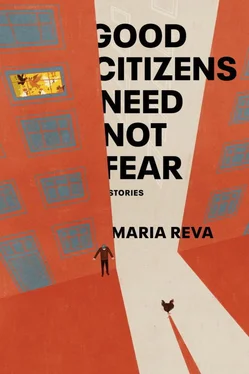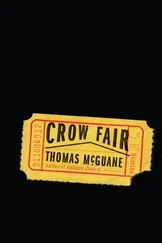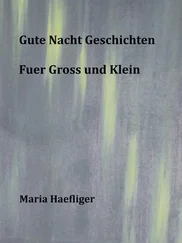Maria Reva - Good Citizens Need Not Fear - Stories
Здесь есть возможность читать онлайн «Maria Reva - Good Citizens Need Not Fear - Stories» весь текст электронной книги совершенно бесплатно (целиком полную версию без сокращений). В некоторых случаях можно слушать аудио, скачать через торрент в формате fb2 и присутствует краткое содержание. Город: New York, Год выпуска: 2020, ISBN: 2020, Издательство: Doubleday, Жанр: Современная проза, humor_satire, на английском языке. Описание произведения, (предисловие) а так же отзывы посетителей доступны на портале библиотеки ЛибКат.
- Название:Good Citizens Need Not Fear: Stories
- Автор:
- Издательство:Doubleday
- Жанр:
- Год:2020
- Город:New York
- ISBN:978-0-38554-529-7
- Рейтинг книги:3 / 5. Голосов: 1
-
Избранное:Добавить в избранное
- Отзывы:
-
Ваша оценка:
- 60
- 1
- 2
- 3
- 4
- 5
Good Citizens Need Not Fear: Stories: краткое содержание, описание и аннотация
Предлагаем к чтению аннотацию, описание, краткое содержание или предисловие (зависит от того, что написал сам автор книги «Good Citizens Need Not Fear: Stories»). Если вы не нашли необходимую информацию о книге — напишите в комментариях, мы постараемся отыскать её.
Good Citizens Need Not Fear: Stories — читать онлайн бесплатно полную книгу (весь текст) целиком
Ниже представлен текст книги, разбитый по страницам. Система сохранения места последней прочитанной страницы, позволяет с удобством читать онлайн бесплатно книгу «Good Citizens Need Not Fear: Stories», без необходимости каждый раз заново искать на чём Вы остановились. Поставьте закладку, и сможете в любой момент перейти на страницу, на которой закончили чтение.
Интервал:
Закладка:
A cluster of cupolas peeked above the treetops. They appeared to have been skinned, with only the bulbous metal skeletons remaining. As he drove, the cupolas seemed to retreat into the distance, wary of the approaching stranger, but he soon caught up with them.
Internat Number 12, Konstantyn discovered, was an old monastery. The edifice sagged as if a great invisible hand were pressing on it from above. One of the towers had crumbled, its ruins laced with the roots of trees.
Konstantyn parked the rickety Zaporozhets alongside an iron fence. As he retrieved the first cloth sack from the trunk, he felt the weight of many eyes on the back of his neck. He gave a timid wave to the children watching him from arched windows. They kept still, as though painted onto the glass.
Finding the gates locked, Konstantyn turned to the small white box welded to a fence post, and pressed its red button. After a moment, a low staticky voice, a woman’s, came on. “Yes?”
“I’d like to donate clothes.” He said this loudly and clearly, as if his wife were hiding behind one of the pines, watching.
“You’re from the Textile Union?”
“No.”
“What’s the organization?”
“Just a lone citizen.”
After a pause, she asked, “What is it you want from us?”
He leaned in, thinking she had misheard. “I’m here to give clothing. To the children.”
It was then he saw Orynko Bondar.
Or rather, a flash of Orynko Bondar, in another girl’s face. One of the second-story windows was open, and a teenager rested her chin on the stone sill. Only her buzzed head was visible. Konstantyn thought she perfectly captured the vacant gaze of a fashion model. The orphan wasn’t beautiful like Orynko, but there was something Orynko-ish in her—the dashes of the brows and lips, the jut of the jaw—as if an artist had tried to sketch the beauty queen in not-quite-sufficient light, using the nondominant hand.
“Leave the clothes by the gates,” the woman instructed through the intercom. “I’ll have someone pick them up.”
Konstantyn set the sack down, but did not leave. He was still looking at the girl. Now he thought of the Greater Good. The Greater Good mattered most—wasn’t that what he’d been taught his whole life? And so he could be forgiven a bit of deceit. He could slip the Orynko-ish girl into Orynko’s place, to compete in the Miss USSR pageant. He would train her himself. In Moscow’s vast Palace of Culture lectorium, each of the contestants would look no bigger than a pinkie finger onstage. Who could tell who was who, and who wasn’t? As for the television broadcast: one could not overestimate the transformative effect of makeup, the distracting property of glitter. When Orynko had stepped onstage at the local pageant, her face powdered and painted, fake lashes flapping, she hadn’t looked quite like Orynko either.
“I’d also like to foster a child,” he announced, “for two months.” He imagined the orphan’s gratitude, and felt bolstered by it.
As the intercom rattled with instructions—forms to procure from the Ministry of Labor and Social Development, signatures to gather, and so on—Konstantyn gazed up, and thought he spotted the woman issuing them. At the fourth-floor window of the nearest tower, a broad-shouldered attendant in a white smock spoke into a phone.
“I’d like to proceed more quickly,” he interrupted. “I’d be happy to leave the clothes here, but I’d also be happy to take them to another orphanage.” He spoke to her as if she were his counterpart, without malice. They locked eyes in recognition, complicity. They both knew what it was to keep afloat an underfunded institution. Her tone softened. “You have a wife? It’s not just you?”
“Not just me.” The more he wanted it to be true, the less it felt like a lie.
“Your wife didn’t come with you.”
“She’s preparing the extra room.”
It seemed as if the attendant wanted this to be true, too. Her sigh crackled through the intercom. “Girl or boy?”
“How about—” Konstantyn feigned deliberation before pointing to the girl at the open window. “Her.”
From her tower, the woman craned her neck out the window to look at the girl. The girl stared at nothing. For a terrible instant, Konstantyn thought she might be dead.
“I’ll bring her right out,” the attendant said quickly, her sudden enthusiasm unnerving. She retreated into the dark depths of the building.
A minute later the girl, too, was gone. The attendant appeared in her place, shut the window. Twenty minutes passed, thirty. Konstantyn considered ringing the intercom, but decided against it. Perhaps the girl was saying her goodbyes to the other children, who must be like brothers and sisters by this point. Perhaps she was tangled in their embraces, navigating the delicate terrain of their envy. Who was he to rush her? The longer he waited, the more he liked the girl.
At last the tall wooden doors of the monastery swung open. The attendant marched down the weedy brick path, pulling the orphan by the wrist. The girl struggled against the woman’s grip, like a child who had just been woken. With her free hand she clutched a dusty pillowcase containing something bulky. “No lice,” the attendant promised, when the pair reached the iron gates. “You can see for yourself.”
Up close, in full light, the teenager was not what he had envisioned. The arms and legs that stuck out of her baggy garment were very thin and pale, so pale they had a bluish glow. A thick white scar curdled her skin from nose to upper lip. This, combined with the buzzed head, the rough features, gave her a criminal look. And yet, once more Orynko flitted across the girl’s face. This time the resemblance gave him a queasy feeling, recalled a shape-shifting octopus he had once seen on television, which survived its hostile habitat by mimicking anything from seaweed to a pile of poisonous snakes.
“Meet Zaya.” The attendant pronounced the name like a challenge.
The girl regarded Konstantyn not with the timidity he expected of an orphan, but with a fierce intensity, as if she already knew Konstantyn and had decided long ago she disliked him.
Konstantyn felt his leg take a step back. He wanted to take another step, then another, until he reached the car and drove away. It took a momentous effort to twist his mouth into a smile. He leaned down to address the girl on the other side of the fence, but could not find anything to say. He had already forgotten her name.
The attendant unlocked the gates, ushered the orphan out, grabbed the sack of clothes Konstantyn had rested on the ground, clacked the gates shut. “Thank you for your kind donation. See you in two months.”
When Konstantyn opened the trunk of the car, the girl drew back, as if he were about to throw her inside it. He gave a small high laugh. “It’s for your things.” He pointed at the remaining sack of his wife’s clothes as an example (he had kept it back at the last moment for pageant needs). The girl gripped her bundle tighter to her chest. When he opened the passenger door, she made no move toward it. He rolled down the window, hoping this, too, would somehow prove the car’s safety. He demonstrated getting in and out of the car while she watched, and thought he caught a cruel curl of her lip. He even suggested she walk beside the moving car as he held her hand—he feared she might run away—anticipating she would eventually tire and get in. But when he extended his hand, she struck it with the back of hers, hard. The orphan’s strength alarmed him. When at last he threatened to drive away, leave her in that terrible place, she glowered at him, daring him to.
He sank behind the wheel but did not start the engine. With shaking, stinging fingers he tried to light a cigarette. On the fourth try he succeeded, and was about to take a grateful drag, when the cigarette left his lips.
Читать дальшеИнтервал:
Закладка:
Похожие книги на «Good Citizens Need Not Fear: Stories»
Представляем Вашему вниманию похожие книги на «Good Citizens Need Not Fear: Stories» списком для выбора. Мы отобрали схожую по названию и смыслу литературу в надежде предоставить читателям больше вариантов отыскать новые, интересные, ещё непрочитанные произведения.
Обсуждение, отзывы о книге «Good Citizens Need Not Fear: Stories» и просто собственные мнения читателей. Оставьте ваши комментарии, напишите, что Вы думаете о произведении, его смысле или главных героях. Укажите что конкретно понравилось, а что нет, и почему Вы так считаете.












